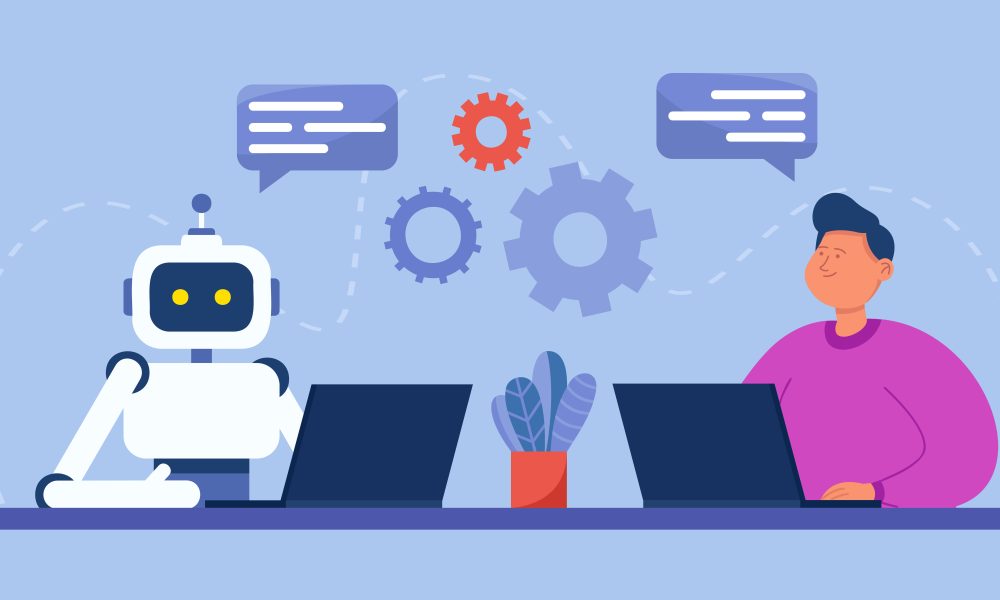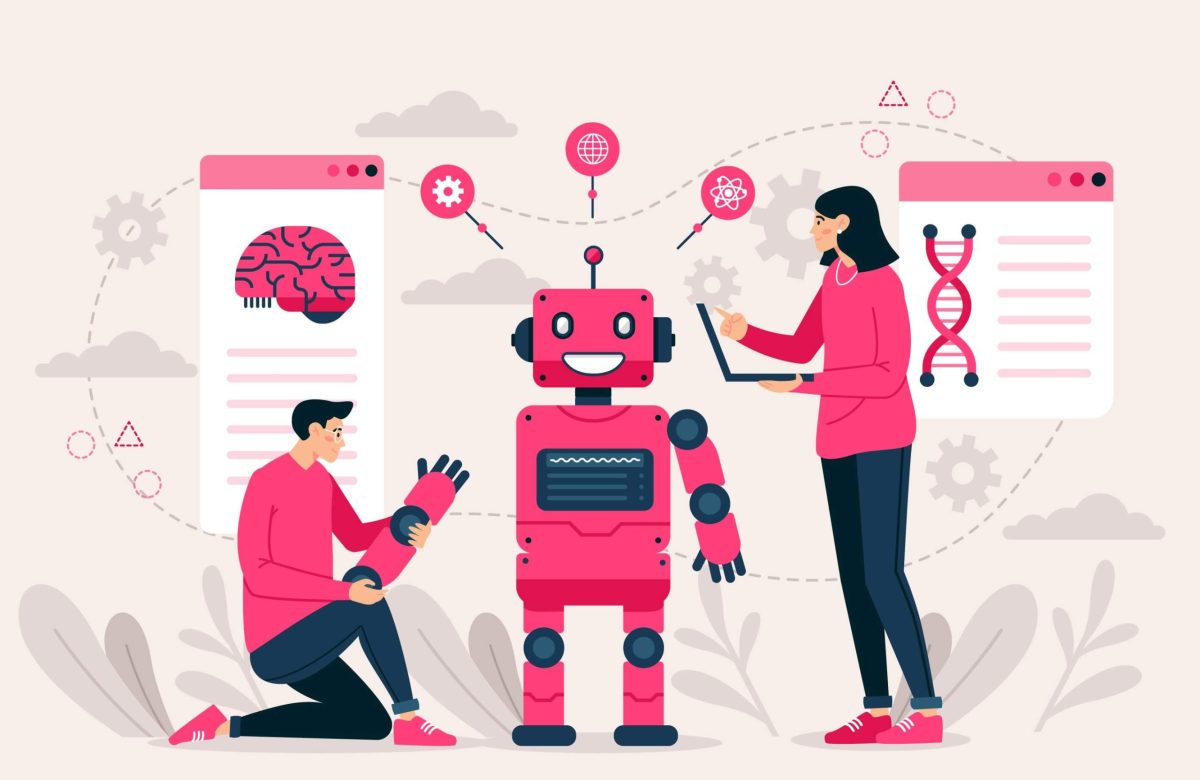AI in Software Development: Transforming Roles and Impacts
Table of Contents
- Introduction
- The Role of AI in Software Development
- Benefits of AI-Assisted Software Development
- AI Use Cases in Software Development
- Difficulties and Risks of AI in Software Development
- Best Practices for Integrating AI into Software Development
- Conclusion
Introduction
Artificial Intelligence (AI) has reshaped numerous sectors, and software development is at the forefront of this transformation. The integration of AI into development practices has introduced unprecedented advancements, significantly altering how software is conceived, designed, and executed. AI’s ability to aid in code generation, identify bugs, and facilitate planning represents a groundbreaking change in software engineering, equipping developers with tools that boost productivity and innovation.
The Role of AI in Software Development
AI’s influence on software development is multifaceted, encompassing automation, error detection, and intelligent analysis. These AI capabilities address various challenges inherent in software engineering, such as handling complex codebases and optimizing workflows. AI acts as a strategic partner, alleviating routine burdens and enabling developers to focus on higher-level problem-solving.
1. Automation of Repetitive Tasks
AI makes routine tasks like code formatting, syntax checking, and documentation easier. By automating these repetitive activities, AI frees developers from monotonous work, allowing them to invest more time in solving intricate problems and fostering innovation.
2. Enhanced Code Functionality Insight
AI tools offer deep insights into code functionality, helping developers understand the impact of their changes and foresee potential issues. These insights facilitate informed decision-making and improve overall code quality.
3. AI Tools Revolutionizing Software Development
Several AI tools have become game-changers in the software development industry, significantly enhancing efficiency and accuracy. GitHub Copilot, created by GitHub and OpenAI, is an AI-driven code completion tool that helps developers by proposing complete lines or sections of code while they type. This tool not only accelerates the coding process but also ensures adherence to consistent coding standards.
Another significant tool is DeepCode, an AI-driven platform for code review and bug detection. DeepCode uses machine learning to analyze codebases and provide real-time feedback on potential bugs, code smells, and areas for improvement. By leveraging historical data and common coding patterns, DeepCode helps developers identify and fix issues early in the development cycle, ensuring higher code quality and reliability.
These tools exemplify how AI can be integrated into software development workflows to automate routine tasks, enhance code quality, and accelerate project timelines. As AI technology continues to evolve, the adoption of such tools is expected to become even more widespread, further transforming the software development landscape.
Benefits of AI-Assisted Software Development
The adoption of AI in software development yields several significant benefits, including increased productivity, improved accuracy, enhanced collaboration, and greater accessibility.
1. Increased Productivity
AI-powered tools automate different facets of software development, including code creation and testing. This automation accelerates the development process and increases productivity by allowing developers to concentrate on more intricate and innovative tasks. AI’s ability to handle repetitive tasks means developers can complete projects faster and with higher efficiency.
2. Improved Accuracy
AI enhances code accuracy through advanced code generation and bug detection capabilities. By leveraging machine learning algorithms, AI tools can identify errors and vulnerabilities that may be overlooked by human developers. This increased accuracy reduces the likelihood of bugs and ensures a more reliable final product.
3. Enhanced Collaboration
AI tools facilitate better collaboration among team members by demystifying complex code and offering actionable suggestions. These tools help bridge communication gaps, leading to more cohesive and efficient development processes. AI-powered platforms enable real-time code sharing and collaborative debugging, fostering a more integrated team environment.
4. Greater Accessibility
AI-supported development tools make programming easier for those with limited coding expertise. With features such as automated code generation and intelligent code suggestions, non-technical stakeholders can participate in the development process. This increased accessibility democratizes software development and opens opportunities for a broader range of contributors.
AI Use Cases in Software Development
The application of AI in software development encompasses various use cases that address different aspects of the development lifecycle. These use cases include code generation, bug detection, code analysis, testing, and advanced planning.
1. Code Generation
AI algorithms can automate code writing by learning from existing codebases and generating new code based on specific parameters. This capability not only speeds up development but also ensures consistency and adherence to coding standards. AI-powered code generators can create boilerplate code, implement design patterns, and even suggest code optimizations.
2. Bug Detection
AI tools excel in identifying and prioritizing bugs by analyzing historical data and common code errors. These tools use machine learning to detect anomalies and potential issues early in the development cycle. Rapid bug detection helps reduce bottlenecks and ensures a smoother and more efficient development process.
3. Code Analysis
AI-driven code analysis tools break down complex codebases to provide insights into code quality and potential improvements. By analyzing code patterns and performance metrics, these tools help developers enhance their coding skills and optimize their code for better performance and maintainability.
4. Testing and Quality Assurance
AI revolutionizes testing and quality assurance by automating test case generation and execution. AI tools can predict potential software flaws under various conditions and automate regression testing, ensuring that new changes do not introduce new issues. This automation enhances product quality and reduces technical debt by identifying and addressing issues early in the development process.
5. Advanced Planning
AI aids in advanced planning by analyzing project requirements, resource allocation, and potential risks. AI tools provide insights into project timelines, resource needs, and budget forecasts, enabling more accurate and effective planning. This advanced planning capability helps organizations manage development projects more efficiently and predict potential challenges.
Also Read: Vite vs Create React App In 2024
Difficulties and Risks of AI in Software Development
While AI offers numerous benefits, its integration into software development also presents challenges and risks. These include concerns about AI skill obsolescence and potential equity gaps in AI access.
1. AI Skill Threat
As AI tools become more sophisticated, there is a growing concern among developers about the potential obsolescence of their skills. The fear of being replaced by AI can impact developer motivation and productivity. To address this challenge, organizations must emphasize continuous learning and skill development, ensuring that developers can adapt to and leverage AI advancements effectively.
2. Potential Equity and Opportunity Gaps
The integration of AI in software development may exacerbate equity and opportunity gaps, particularly if access to AI tools and training is uneven. Ensuring that all developers have equal access to AI resources and training is crucial for maintaining a fair and inclusive development environment. Organizations should prioritize addressing these gaps to foster a more equitable and effective development ecosystem.
Best Practices for Integrating AI into Software Development

To successfully integrate AI into software development, organizations should adopt best practices that ensure effective collaboration between AI tools and human developers. These best practices include fostering a culture of continuous learning, encouraging collaboration, and addressing equity concerns.
1. Foster a Culture of Continuous Learning
Organizations should promote a culture of continuous learning and skill development to help developers stay abreast of AI advancements. Providing ongoing training and resources enables developers to effectively utilize AI tools and stay relevant in a rapidly evolving technological landscape.
2. Encourage Collaboration
Encouraging collaboration between AI tools and human developers is essential for maximizing the benefits of AI. Organizations should facilitate communication and teamwork, ensuring that AI tools complement human expertise and contribute to a more cohesive development process.
3. Implement AI Tools Gradually
Implementing AI tools gradually allows organizations to assess their impact and effectiveness before full-scale adoption. Providing adequate training and support during the implementation phase ensures a smooth transition and helps developers integrate AI tools into their workflows seamlessly.
4. Address AI Skill Threat and Equity
Organizations should address concerns related to AI skill threat and equity by ensuring equal access to AI tools and training. Developing strategies to support developers in adapting to AI advancements and addressing potential equity gaps fosters a more inclusive and effective development environment.
Conclusion
The integration of AI into software development is transforming the industry by enhancing productivity, accuracy, and collaboration. By understanding the benefits, use cases, and challenges of AI-assisted development, organizations can harness AI’s full potential to drive innovation and success. Embracing best practices and addressing potential risks will enable developers to leverage AI effectively, ensuring a more efficient and equitable software development process.


2 Comments
Top Digital Marketing Trends to Watch in 2024 - W3ITEXPERTS
August 1, 20243:37 pm
[…] Also Read: AI in Software Development: Transforming Roles and Impacts […]
Top Web Development Technologies: Future-Proof Your Website - W3ITEXPERTS
September 12, 20245:48 pm
[…] Also Read: AI in Software Development: Transforming Roles and Impacts […]